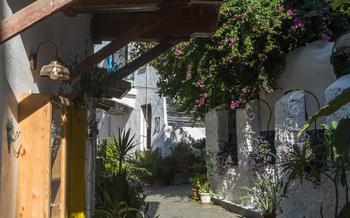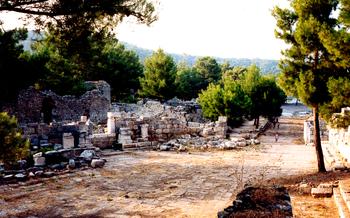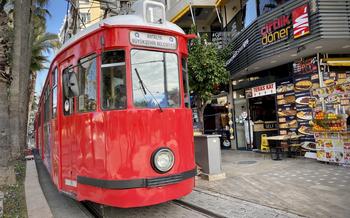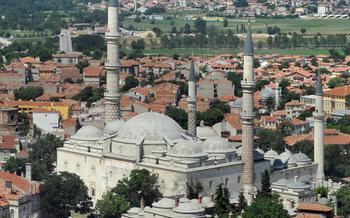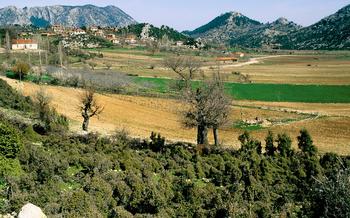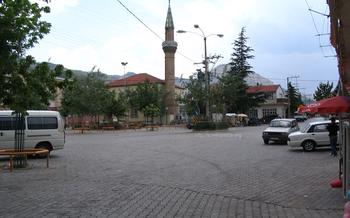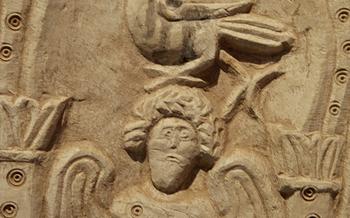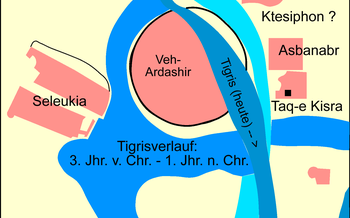
Adada Ancient City
- Adada Ancient City: An Overview
- Unveiling the History
- Exploring the Ruins
- Marveling at the Architecture
- Discovering the Necropolis
- Immerse in Local Crafts
- Feast on Regional Delights
- Embrace the Rose Festival
- Venture into the Taurus Mountains
- Venture into the Taurus Mountains:
- Unwind in the Thermal Springs
- Delve into the Archaeological Museum
- Shop for Local Delights
- Embrace the Local Culture
- Insider Tip:
Adada Ancient City: An Overview
Adada Ancient City stands as a testament to the rich history and cultural significance of Isparta. Once a thriving urban center, Adada's origins date back to the Hellenistic period, with evidence suggesting its existence as early as the 3rd century BC. The city flourished under the rule of various ancient civilizations, including the Romans and Byzantines, leaving behind a treasure trove of archaeological wonders.
Adada's strategic location, nestled amidst the fertile plains of Isparta, contributed to its prominence as a trading hub and agricultural center. Today, visitors can easily access the ancient city, situated just 15 kilometers from the city of Isparta. The best time to visit Adada is during the spring or fall, when the weather is pleasant, and the crowds are fewer, allowing for a more immersive and tranquil exploration of this ancient marvel.
A visit to Adada promises an enriching experience, transporting visitors back in time as they uncover the secrets of this bygone era. From its imposing city walls to well-preserved public buildings and intricate necropolis, Adada offers a glimpse into the lives of its inhabitants and the civilizations that shaped its destiny.
Unveiling the History
Adada's historical roots are deeply intertwined with mythology and legends. According to ancient tales, the city was founded by the legendary hero Bellerophon, who tamed the winged horse Pegasus and used it to defeat the monstrous Chimera. As a reward for his valor, Bellerophon was granted the land where he built Adada.
The city flourished under the rule of various civilizations throughout history, each leaving its unique mark. It was part of the powerful Lycian League during the Hellenistic period, where it served as a significant religious and administrative center. Later, the Romans conquered Adada, incorporating it into their vast empire. During the Byzantine era, the city embraced Christianity and became an important ecclesiastical center.
Archaeological excavations have uncovered a wealth of artifacts, including inscriptions, coins, and pottery, shedding light on Adada's rich past. Ongoing excavations continue to reveal new discoveries, providing valuable insights into the city's urban planning, economic activities, and social structure.
One of the most remarkable features of Adada is its well-preserved theater. Built during the Roman period, the theater could accommodate up to 5,000 spectators and was used for theatrical performances, concerts, and public gatherings. The theater's impressive acoustics and intricate architectural details attest to the high level of craftsmanship and artistry that adorned Adada's public spaces.
Exploring the Ruins
At Adada Ancient City, numerous significant landmarks and structures stand as testaments to its glorious past. The massive city walls, once serving as a defensive barrier, offer impressive insights into the city's strategic importance. These well-preserved fortifications, with their imposing gates and towers, showcase the engineering prowess of ancient builders.
Within the city's core, visitors can marvel at well-preserved public buildings, including the agora, the bustling marketplace where locals once gathered for trade and social interactions. The agora's layout, with its colonnaded walkways and central courtyard, provides a glimpse into the vibrant commercial activities that took place here.
Equally impressive are the remains of residential areas, offering a window into the daily lives of Adada's inhabitants. Here, visitors can explore the foundations of houses, workshops, and other structures, each revealing unique stories about the people who once called this ancient city home.
Marveling at the Architecture
Adada's architecture showcases a distinctive blend of Hellenistic, Roman, and Byzantine styles, reflecting the city's rich cultural heritage. The city walls, constructed with massive stone blocks, are a testament to the advanced engineering skills of the ancient inhabitants. Intricate carvings and reliefs adorn the walls, depicting scenes from mythology and everyday life.
Within the city, visitors can explore well-preserved public buildings, including the agora (marketplace) and temples dedicated to various deities. The agora, once the center of commercial and social activities, features colonnaded walkways and shops. The temples, with their elegant facades and intricate interiors, offer a glimpse into the religious beliefs and practices of Adada's people.
Residential areas, though partially ruined, provide insights into the daily lives of the city's inhabitants. Houses vary in size and design, reflecting the social hierarchy and economic status of their occupants. Some houses feature elaborate mosaics and frescoes, showcasing the artistic talents of Adada's craftsmen.
Adada's architecture is not merely a collection of buildings but a testament to the cultural and artistic achievements of past civilizations. Each structure tells a story, revealing the influences, beliefs, and aspirations of the people who once called this ancient city home.
Discovering the Necropolis
Adada's extensive necropolis, located just outside the city walls, is a fascinating sight that provides valuable insights into the funerary practices and beliefs of its ancient inhabitants. The necropolis is home to a diverse array of tombs, each with its own unique characteristics and stories to tell.
Among the most impressive tombs are the rock-cut structures, which showcase the skill and artistry of ancient craftsmen. These tombs are carved directly into the natural rock formations, creating elaborate facades and intricate interiors. Some of these tombs feature multiple chambers, with niches and alcoves for burials.
Another notable feature of the necropolis is the presence of sarcophagi, which were used to hold the remains of the deceased. These stone coffins are often elaborately decorated with carvings, inscriptions, and other embellishments that reflect the status and wealth of the individuals buried within.
The variety of tombs in the necropolis highlights the diverse burial customs practiced in Adada. Some tombs were designed for single burials, while others were intended for multiple family members or individuals. The presence of both cremation and inhumation burials suggests that different cultural and religious influences were present in the city.
Exploring the necropolis is an enriching experience that allows visitors to connect with the past and gain a deeper understanding of the lives and beliefs of Adada's ancient inhabitants. It offers a glimpse into the rituals and traditions surrounding death and afterlife in this ancient city.
Immerse in Local Crafts
Isparta is renowned for its vibrant carpet weaving traditions, which have been passed down through generations. The intricate designs and vibrant colors of Isparta carpets are a testament to the skill and artistry of local weavers. Visitors can witness the art of carpet making firsthand at workshops and demonstrations, where they can learn about the techniques and processes involved in creating these beautiful textiles.
These workshops provide a glimpse into the cultural heritage of Isparta and offer an opportunity to purchase authentic handmade carpets as souvenirs or gifts. The intricate patterns and designs often incorporate traditional motifs and symbols, reflecting the region's rich history and cultural influences.
Carpet weaving plays a vital role in the local economy, providing employment and supporting traditional crafts. By purchasing an Isparta carpet, visitors can directly contribute to the preservation of this ancient tradition and support the livelihoods of local artisans.
Feast on Regional Delights
Isparta's cuisine is a delightful blend of flavors, showcasing the region's fresh ingredients and unique culinary traditions. Among the must-try dishes is "Isparta gül böreği," a rose-shaped pastry filled with a sweet and savory filling. The delicate layers of filo dough and the fragrant rose petals create a harmonious taste that is both visually appealing and tantalizing to the palate.
Another local delicacy is "keşkek," a hearty and flavorful stew made from wheat, meat, and spices. This dish, often served during special occasions and festivals, embodies the warmth and generosity of Ispartan hospitality. The tender wheat grains, combined with the rich broth and succulent meat, create a comforting and satisfying meal that is sure to leave a lasting impression.
Isparta's gastronomy has been influenced by various cultures throughout history, including Turkish, Ottoman, and Mediterranean traditions. This fusion of flavors is evident in the city's diverse culinary offerings, from traditional Turkish kebabs to Mediterranean-inspired seafood dishes.
To fully immerse yourself in the local culinary scene, visit the vibrant local markets and restaurants. Here, you can sample fresh produce, spices, and sweets that reflect Isparta's culinary diversity. Engage with friendly vendors who are more than happy to share their knowledge about local ingredients and cooking techniques.
Whether you're savoring the delicate sweetness of rose-shaped pastries or indulging in the hearty flavors of keşkek, Isparta's cuisine is a feast for the senses, offering a taste of the region's rich cultural heritage.
Embrace the Rose Festival
Every year, the enchanting Isparta Gül Festival fills the air with the sweet fragrance of roses, showcasing the region's deep connection to these beloved flowers. This vibrant celebration is a testament to the cultural significance of roses in Isparta, attracting visitors from far and wide.
During the festival, the streets of Isparta transform into a kaleidoscope of colors as colorful parades, cultural performances, and exhibitions take place. The festival provides a unique opportunity to immerse yourself in the world of roses, sampling rose-infused delicacies, purchasing rose-related souvenirs, and witnessing the passion and dedication of local artisans who create exquisite rose-based products.
The Isparta Gül Festival is not just a celebration of roses; it's a celebration of Isparta's rich cultural heritage and its commitment to preserving and promoting its unique identity. By participating in this festival, you'll not only experience the beauty and fragrance of roses but also gain a deeper understanding of the region's culture and traditions.
Venture into the Taurus Mountains
Beyond the historical and cultural wonders of Isparta, the Taurus Mountains beckon travelers with their breathtaking landscapes and diverse natural attractions. Located within easy reach of the city, these majestic mountains offer a sanctuary for outdoor enthusiasts and nature lovers alike.
Hiking trails of varying difficulty levels wind through the rugged terrain, leading to scenic viewpoints that unveil panoramic vistas of the surrounding region. As you ascend, the air becomes crisp and invigorating, while the panoramic views stretch as far as the eye can see—a tapestry of verdant forests, rugged peaks, and distant valleys.
The Taurus Mountains are home to a rich diversity of flora and fauna, including unique plant species and wildlife that thrive in this pristine environment. Keep an eye out for soaring eagles, nimble ibex, and perhaps even a glimpse of the elusive Anatolian leopard.
Whether you prefer to trek through the rugged trails, camp under the starry sky, or simply relax and enjoy the tranquility of nature, the Taurus Mountains offer an unforgettable escape from the hustle and bustle of city life. Embrace the call of the wild and venture into this natural paradise for an exhilarating and rejuvenating experience.
Venture into the Taurus Mountains:
Nestled near the city of Isparta, the majestic Taurus Mountains beckon adventurers with their breathtaking landscapes and diverse natural wonders. Lace-up your hiking boots and embark on scenic trails that wind through lush forests, leading to panoramic viewpoints offering unparalleled vistas of the region. Immerse yourself in the symphony of nature as you encounter a rich tapestry of flora and fauna, including rare plant species and elusive wildlife. Whether you seek solitude amidst towering peaks or adrenaline-pumping outdoor adventures, the Taurus Mountains offer an unforgettable escape for nature enthusiasts and adventure seekers alike.
Unwind in the Thermal Springs
Immerse yourself in the tranquility and therapeutic benefits of Isparta's natural thermal springs. Discover hidden oases where warm, mineral-rich waters soothe your body and mind. Relax in the serene ambiance of spa facilities, surrounded by picturesque landscapes. Experience the healing power of these thermal waters, known to alleviate stress, improve circulation, and promote overall well-being. Uncover the local traditions and customs associated with these natural wonders, gaining insights into the cultural significance of bathing in thermal springs.
Delve into the Archaeological Museum
Enrich your understanding of Isparta's rich history and cultural heritage with a visit to the Isparta Archaeological Museum. Step into the realm of ancient civilizations as you explore exhibits that showcase artifacts unearthed from Adada and other significant sites in the region. Discover intricate pottery, gleaming jewelry, and awe-inspiring sculptures that provide glimpses into the daily lives, artistic expressions, and religious practices of past inhabitants. The museum's collection offers a fascinating journey through the ages, allowing you to unravel the stories behind the artifacts and gain a deeper appreciation for Isparta's diverse cultural heritage.
Shop for Local Delights
Isparta's bustling markets and shops offer a treasure trove of unique souvenirs and local products that encapsulate the region's rich cultural heritage. From intricately designed carpets and pottery to gleaming jewelry and shimmering textiles, these vibrant bazaars are a shopper's paradise.
In the heart of the city, the Grand Bazaar beckons with its labyrinthine alleys lined with stalls brimming with an array of goods. Here, you can find authentic Turkish handicrafts, each piece a testament to the skill and artistry of local artisans. Carpets in vibrant hues and intricate patterns, hand-painted pottery adorned with traditional motifs, and gleaming silverware intricately engraved with delicate designs are just a few of the treasures that await you.
Beyond the Grand Bazaar, smaller shops and boutiques offer a more intimate shopping experience. Browse through an eclectic collection of locally made jewelry, from delicate filigree earrings to statement necklaces adorned with colorful gemstones. Discover the art of Turkish pottery in charming ceramics shops, where shelves are lined with hand-painted plates, bowls, and vases, each one a unique masterpiece.
Don't miss the opportunity to savor Isparta's culinary delights as you explore the local markets. Fresh produce, aromatic spices, and traditional sweets abound, offering a tantalizing glimpse into the region's rich gastronomic heritage. Indulge in the sweetness of lokum, Turkish delight made with rose water and pistachios, or sample the melt-in-your-mouth künefe, a filo pastry dessert filled with cheese and drizzled with sweet syrup.
As you wander through the markets, embrace the vibrant atmosphere and engage with the friendly local vendors. They are always happy to share stories about their products and offer insights into the local culture. Be sure to haggle gently, as bargaining is a time-honored tradition in Turkish bazaars.
Shopping in Isparta is not just about acquiring souvenirs; it's about immersing yourself in the local culture and taking home a piece of this vibrant and welcoming region.
Embrace the Local Culture
The people of Isparta are renowned for their warm hospitality and welcoming nature. Embracing the local culture is an integral part of experiencing the true essence of the city. Engage with the friendly locals, participate in traditional festivals, and immerse yourself in the vibrant cultural scene. Attend local music performances, witness traditional dances, and learn about the intricate art of carpet weaving. Respecting local customs and traditions is essential to fostering meaningful connections with the community. Whether it's sharing a cup of tea with a local shopkeeper or joining in on a lively village celebration, embracing the local culture offers a unique and enriching experience that will leave you with lasting memories.
Insider Tip:
For an optimal experience when visiting Adada Ancient City and exploring the wonders of Isparta, consider these insider tips:
-
Plan your visit during the shoulder seasons of spring or fall, when the weather is at its most pleasant and the crowds are thinner. This will allow you to fully immerse yourself in the ancient city and its surroundings without the summer crowds.
-
Wear comfortable shoes, as you will be doing a fair amount of walking on uneven terrain while exploring the ruins and the necropolis.
-
Take advantage of the local transportation options or rent a car for convenient travel within the region. This will give you the freedom to explore at your own pace and venture into the nearby attractions such as the Taurus Mountains, Kovada Lake National Park, and the thermal springs.
-
Don't miss the opportunity to try Isparta's famous rose-flavored ice cream, a unique and refreshing treat that perfectly captures the essence of this rose-growing region. Indulge in this local delicacy and savor the sweet, floral notes that have made Isparta renowned for its roses.
